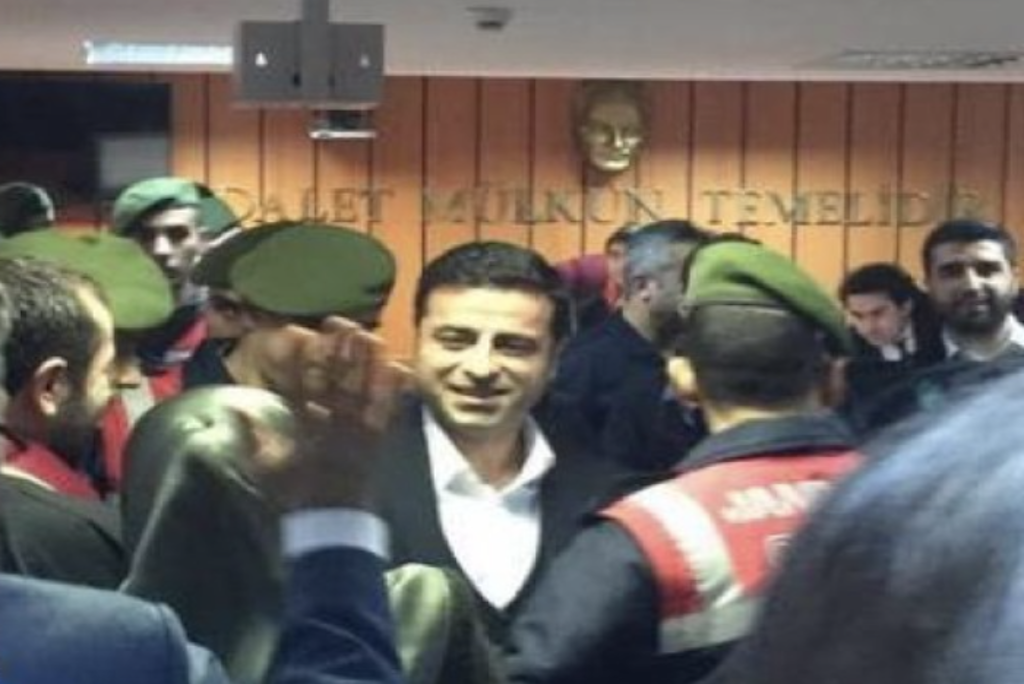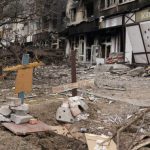This week, the hearings in the endless procedures about the ‘Kobani trials’ were continuing. Several well-known HDP politicians were giving their defenses, among whom Gültan Kışanak and Selahattin Demirtaş. If you follow the cases, you must have noticed that once again, the defendants were not present in the courtroom personally but were present only virtually via video screen. This is not only legally problematic but also deprives political prisoners of the support and love they receive when they are physically present. Also, the courtroom no longer functions as a lousy tea garden in this era of video connections. It all obscures what political trials in Turkey really are: sinister theatre.
I had my first experiences in courtrooms in Turkey during the so-called KCK-trials. These trials started after hundreds of people were detained and arrested since late 2009 for alleged links to the KCK, the umbrella organisation of which also the PKK is a part. The arrested and prosecuted people were not militants at all of course, but mayors and administrators in Kurdish cities, towns and villages, they were human rights activists, journalists, or peaceful activists. The allegations against them, mostly ‘making propaganda for a terrorist organisation’ or ‘being a member of a terrorist organisation’, were not substantiated with any evidence whatsoever.
Real spectacle
I will never forget one of the first KCK hearings that I attended, in the courthouse in Diyarbakır where I had just moved in 2012. One of the people on trial was Kurdish MP Selma Irmak, but there were many more defendants present in the court room. It was a real spectacle when the defendants were brought into the court room: all their relatives, friends and supporters on the public tribune got up, started waving at their loved ones and defendants and citizens were trying to have short conversations, making themselves heard with shouting and gesturing.
Little had I expected that after that, when the judges came in and the hearing started, nobody was really paying attention. The lawyers were of course and the judges to some extend, but the defendants were just chatting with each other, turned around on their chairs, hardly whispering and sometimes chuckling. I remember my confusion. What was happening here? Weren’t these people on trial for terrorism? Of course, I knew the charges were nonsense, but how could they take the prospect of being locked up for years so lightly? All they needed was a pot of tea to complete their day outside prison in the court room with their fellow inmates, and their families and friends closeby to smile and wave at, and shout-talk to whenever there was a break.
Puppets
It dawned on me that the Kurds on trial just didn’t take the judiciary system seriously in any way whatsoever. It was not their justice system. They were puppets in a sham theatre trial, and refused to play that part.
The Diyarbakır court room was small, and quite something different than the huge one in Silivri, close to Istanbul. That’s where the so-called KCK press trial took place, in which a few dozen Kurdish journalists were prosecuted for absolutely nothing. Out of solidarity for my colleagues and for journalistic reasons, I attended those trials several times as well. We’d meet up early in the morning at the premises of Kurdish paper Özgür Gündem in the heart of Istanbul, and leave for Silivri in a minibus or in a couple of cars.
Eye contact
No theatre in Silivri like in Diyarbakır. The court room was immense. The defendants would be brought in and you could hardly distinguish who was who from the distance between their seats and the public tribune. I waved at one of the journalists I knew personally and I think he waved back, but I wasn’t even sure who he was waving at. Eye contact was impossible, and family members couldn’t shout their latest news from the family and the village to their loved ones because they couldn’t make themselves heard. I received a letter from the journalist I knew, in which he described the brutal architecture of the court house and drew a direct parallel with the brutality of the state.
There was another important difference between the court houses in Diyarbakır and Istanbul: the first was in the city and very easy to reach, while the latter was quite a ride from Istanbul with hardly or no public transport. Most of the relatives of the defendants in Istanbul lived elsewhere, often in Kurdistan, and they didn’t have the means to attend all the hearings and sometimes none at all.
Big screen
And now, even the defendants don’t come to the court room anymore. The so-called SEGBIS-system for electronic audio-visual informatics enables the defendant to be ‘present’ via videolink while he or she is in jail. The defendant is visible on a big screen in the court room. Needless to say that this has fully destroyed all possibilities for the defendant to connect with their support base and to feel their love and solidarity, to look them in the eye, to wave at them, blow a kiss to them or radiate smiles across the room. This is besides the legal problems that the SEGBIS-system causes, as laid out by a lawyer here: defendants have the right to attend their trials, and to consult with their lawyers, both of which are rendered impossible by SEGBIS.
Kurdish political prisoners have always known what a travesty of justice the Turkish legal system is, but at least, the theatres they were forced to attend every now and then held a promise of recharging themselves with the love, support and solidarity of their people. Within just a couple of years, this live theatre that provided at least some warmth, has turned cold as ice. A sinister play, the end of which the dehumanized players are deeply longing for.
Close the curtain. Free them all.
By: Fréderike Geerdink
Fréderike Geerdink is an independent journalist. Follow her on Twitter, or subscribe to her acclaimed weekly newsletter Expert Kurdistan.
Source:MedyaNews
***Show us some LOVE by sharing it!***



